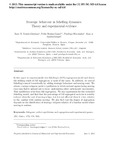Mostrar el registro sencillo del ítem
Strategic behaviour in Schelling dynamics: theory and experimental evidence
| dc.creator | Benito Ostolaza, Juan Miguel | es_ES |
| dc.creator | Brañas Garza, Pablo | es_ES |
| dc.creator | Hernández, Penélope | es_ES |
| dc.creator | Sanchis Llopis, Juan A. | es_ES |
| dc.date.accessioned | 2020-09-16T11:21:48Z | |
| dc.date.available | 2020-09-16T11:21:48Z | |
| dc.date.issued | 2015 | |
| dc.identifier.issn | 2214-8043 | |
| dc.identifier.uri | https://hdl.handle.net/2454/38130 | |
| dc.description.abstract | In this paper we experimentally test Schelling’s (1971) segregation model and confirm the striking result of segregation. In addition, we extend Schelling’s model theoretically by adding strategic behaviour and moving costs. We obtain a unique subgame perfect equilibrium in which rational agents facing moving costs may find it optimal not to move (anticipating other participants’ movements). This equilibrium is far from full segregation. We run experiments for this extended Schelling model, and find that the percentage of full segregated societies notably decreases with the cost of moving and that the degree of segregation depends on the distribution of strategic subjects. | en |
| dc.description.sponsorship | Financial support from the Spanish Economy and Competitiveness Ministry (ECO2014-55745-R, ECO2013-46550-R, ECO2013-44879-R, SEJ-2012-1436, ECO2012-34202), Fundación BBVA, Junta de Andalucía Excelencia (P07-SEJ-02547) and Generalitat Valenciana (PROMETEOII/2014/054) is gratefully acknowledged. | en |
| dc.format.extent | 39 p. | |
| dc.format.mimetype | application/pdf | en |
| dc.language.iso | eng | en |
| dc.publisher | Elsevier | en |
| dc.relation.ispartof | Journal of Behavioral and Experimental Economics, 2015, 57, 134-147 | en |
| dc.rights | © 2015 Elsevier Inc. This manuscript version is made available under the CC-BY-NC-ND 4.0. | en |
| dc.rights.uri | http://creativecommons.org/licenses/by-nc-nd/4.0/ | |
| dc.subject | Subgame perfect equilibrium | en |
| dc.subject | Segregation | en |
| dc.subject | Experimental games | en |
| dc.title | Strategic behaviour in Schelling dynamics: theory and experimental evidence | en |
| dc.type | info:eu-repo/semantics/article | en |
| dc.type | Artículo / Artikulua | es |
| dc.contributor.department | Economía | es_ES |
| dc.contributor.department | Ekonomia | eu |
| dc.rights.accessRights | info:eu-repo/semantics/openAccess | en |
| dc.rights.accessRights | Acceso abierto / Sarbide irekia | es |
| dc.identifier.doi | 10.1016/j.socec.2015.05.007 | |
| dc.relation.projectID | info:eu-repo/grantAgreement/MINECO//ECO2014-55745-R/ES/ | en |
| dc.relation.projectID | info:eu-repo/grantAgreement/MINECO//ECO2013-46550-R/ES/ | en |
| dc.relation.projectID | info:eu-repo/grantAgreement/MINECO//ECO2013-44879-R/ES/ | en |
| dc.relation.projectID | info:eu-repo/grantAgreement/MINECO//ECO2012-34202/ES/ | en |
| dc.relation.publisherversion | https://doi.org/10.1016/j.socec.2015.05.007 | |
| dc.type.version | info:eu-repo/semantics/acceptedVersion | en |
| dc.type.version | Versión aceptada / Onetsi den bertsioa | es |



